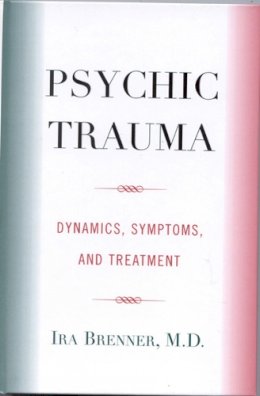
Stock image for illustration purposes only - book cover, edition or condition may vary.
Psychic Trauma
Ira Brenner
FREE Delivery in Ireland
Description for Psychic Trauma
Hardback. This book is about the psychoanalytically informed understanding, recognition, and treatment of severe psychological trauma. It goes beyond the limited notion of posttraumatic stress disorder (PTSD) and addresses the issues associated with problems ranging from physical and sexual abuse to genocidal persecution. Num Pages: 360 pages, illustrations, references, index. BIC Classification: MJN; MMH; MMJ. Category: (G) General (US: Trade). Dimension: 235 x 192 x 25. Weight in Grams: 263.
This book offers a clinical study of psychic trauma and provides a framework through which to understand the long term effects of overwhelming life experiences. Ira Brenner draws on two different populations, those affected by early physical and sexual abuse, as well as those affected by genocidal persecution during the Holocaust.
Product Details
Publisher
Jason Aronson Inc. Publishers United States
Place of Publication
Northvale NJ, United States
Shipping Time
Usually ships in 15 to 20 working days
About Ira Brenner
Ira Brenner, M.D., is clinical professor of psychiatry at Jefferson Medical College and training and supervising analyst at the Psychoanalytic Center of Philadelphia. He was the executive director of the Philadelphia Psychoanalytic Institute as well as the president of the Philadelphia Psychiatric Society. He has worked extensively in the area of psychic trauma for the last 25 years, most notably ... Read moreon the effects of genocidal persecution during the Holocaust and the effects of early physical and sexual abuse. He has lectured nationally and internationally, and recently was on a panel at the U.N. on "Anti-Semitism, Islamaphobia, and Racism," where he spoke on Anti-Semitism. Dr. Brenner is on the editorial board of the Journal of Applied Psychoanalytic Studies where he edited a special edition on the reverberations of the Holocaust. He has written over 50 publications, including a book with Judith Kestenberg, The Last Witness: The Child Survivor of the Holocaust (1996), and his 2001 book, Dissociation of Trauma: Theory, Phenomenology, and Technique. He received the Simon Gratz Research Prize from Jefferson (2000) for his work on the Holocaust, the Piaget Writing Award from the International Society for the Study of Dissociation (2001) for his first book on dissociation, and was recognized as "Practitioner of the Year"(2003) by the Philadelphia Psychiatric Society. Dr. Brenner is a member of Phi Beta Kappa, the AOA medical honor society, the American College of Psychoanalysts, and is a distinguished fellow of the American Psychiatric Association. He is in private practice in the Philadelphia area. Show Less
Reviews for Psychic Trauma
This dynamic and passionate book brilliantly draws the reader into the chaotic and dreadfully injured world of those of our patients who have suffered unspeakable traumas and personality fragmentation. Brenner's evocative and genuine writing style guides one in a deeply disturbing journey, which is so intense it is at times necessary for even the experienced clinician to take a break. ... Read moreGently and patiently he provides solid benchmarks for the clinician and unfailing hope and compassion for the patients. His dissertation on self disclosure and activity of the analyst is a gem in its own right. Brenner is a leader of a new breed of psychoanalysts who are flexible and open in their theoretical and clinical models and insist on keeping the patients' needs at the center of the treatment, in the best Hippocratic tradition. This is destined to be a classic.
Stuart W. Twemlow, MD, clinical professor of psychiatry and behavioral sciences at the University of Kansas School of Medicine Psychic Trauma is conceptually astute, clinically sensitive, and—that all too rare attribute—it is a pleasure to read. Brenner's lucid exploration of the nuances of intergenerational trauma and Dissociative Identity Disorder is illustrated with rich clinical material and informed by his humane sensibility to the therapist's counter-transference issues. This book is essential reading for all mental health clinicians.
Peter Loewenberg, PhD, dean and chair of the Education Committee of the Southern California Psychoanalytic Institute and professor of history and polit A fascinating exploration of the field of trauma, its dynamics, symptoms and treatment. Through this analytic journey, readers can observe the impact of overwhelming life experiences on those affected by severe early sexual abuse, as well as on those marked by the genocidal persecution of the Holocaust. This is a fine fusing of psychodynamic thinking with interactive and neurological approaches that yields an integrative perspective for a richer understanding of trauma.
Ilany Kogan, training analyst, Israel Psychoanalytic Society; author of The Struggle Against Mourning Dr. Brenner has written a path-breaking and pioneering book, which creates a theoretical and clinical model for the understanding and treatment of severely traumatized patients, whose symptoms are of such gravity that they were hitherto considered unsuitable for psychoanalytic treatment. The book studies the architecture of the human mind and its dynamic processes through case presentations of severely traumatized patients. With each chapter another powerful drama unfolds in front of the reader—its plot being life and transference re-enactments of traumatic neuroses. Dr. Brenner is a passionate and empathic observer whose clinical case studies allow for insight of exceptional depth. He is a careful chronicler of his patients' evolving stories and a powerful facilitator of their treatments. The book presents a variety of traumatized patients, such as victims of incest, of sexual abuse during childhood, and with Holocaust survivors. Dr. Brenner carefully avoids any equations and leaves it to his readers to find resonances between the different classes of 'unmetabolized introjects' of severe trauma.
Dori Laub, MD Show Less

